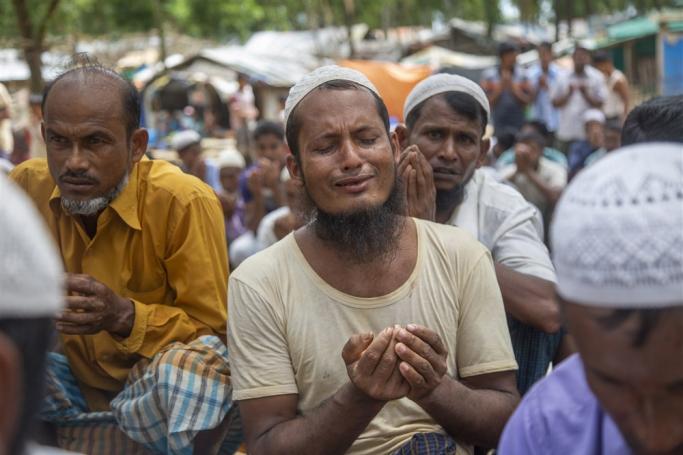201 civil society organisations (CSOs) have signed a letter to the United Nations (UN) Secretary-General voicing their concerns about plans to repatriate Rohingyas from refugee camps in Bangladesh back to Myanmar.
The Myanmar and Bangladesh governments have had meetings to discuss the plans and the UN has also been involved.
Below is the letter the CSOs sent to the UN Secretary-General:
The undersigned 201 civil society organizations strongly condemn UN’s participation in the so-called ‘pilot project ’to repatriate Rohingya refugees from Bangladesh to Myanmar. The undersigned organizations are appalled by the UN’s clandestine participation and involvement in facilitating a visit of Myanmar military junta to Cox’s Bazar in Bangladesh. The UN agencies that were involved in the visit reportedly removed UN markings from the boats which were used to transport members of the junta to Cox’s Bazar. This is yet another extension of the long-standing pattern of the UN’s deliberately opaque involvement in the attempts to forcibly repatriate Rohingya refugees in absence of conditions in Myanmar for their safe, voluntary, dignified and sustainable return. This exposes the UN’s lack of so-called “neutrality” in Myanmar, and its ongoing failure to uphold basic humanitarian principles of humanity, impartiality and “do no harm”, further eroding Myanmar people’s trust in the work of the UN.
The most recent visit of the junta to Cox’s Bazar on 15 March 2023 as part of this ‘pilot project ’for repatriation which took place reportedly with participation of UN High Commissioner for Refugees (UNHCR) and the World Food Programme (WFP) is a result of a bilateral agreement between the illegal Myanmar military junta and Bangladesh, mediated by the Chinese Government. As the Special Rapporteur has described in his most recent conference paper, the Myanmar military junta’s attempt to seize power from legitimately elected representatives of the people of Myanmar elected in the 2020 General Election “was illegal, and its claim as Myanmar’s government is illegitimate.”
The UN Secretary-General must immediately intervene to prevent Rohingya survivors of genocide from being sent back to the killing fields. Rohingya in Rakhine State continue to be persecuted, denied their right to citizenship under a system of apartheid. They are confined to camps without freedom of movement and cut off from access to food and essential services including health, education and livelihood. The same perpetrators of genocide and crimes against humanity continue to commit atrocity crimes with total impunity throughout the country since the attempted coup of 1 February 2021. Prior to the attempted
coup, they have committed genocide against Rohingya and crimes against humanity and war crimes against other ethnic minorities for decades, as documented by the UN Independent International Fact-Finding Mission.
The Secretary-General must also urgently investigate the involvement of UNHCR and WFP in the pilot repatriation project. Importantly, the Secretary-General must develop an action plan that meaningfully and urgently implements the recommendations of the “Rosenthal Report” which found systemic and institutional failures on the part of the UN in Myanmar leading up to and during the genocide in 2017. The 2022 update by the Secretary-General on the “Progress made in the implementation of follow-up action to the recommendations” of the Rosenthal Report failed to address the grave issues specific to Myanmar that were identified in the Rosenthal Report. The report did not satisfy the UN Human Rights Council’s call for a “comprehensive” investigation and did not reflect the extraordinary gravity of UN’s systemic failure in Myanmar.
The internal communication from the UN’s top official, as outlined by the Myanmar Accountability Project, exposes the UNHCR’s willingness to capitulate to the genocidal military junta despite “UNHCR’s assessment that conditions in Rakhine State (to which they will be returned) are currently not conducive to the safe and sustainable return of Rohingya refugees.” The UNHCR’s decision to prioritize its relationship with the military junta and the Bangladeshi Government above safety, security and revictimization of Rohingya refugees points to the broader UN approach which is completely out of touch with the reality on the ground. Rather than protecting refugees, the agency is therefore repeating its past mistakes by putting the lives of refugees at risk.
The Rosenthal Report also speaks to the failure of the UN’s collective membership, represented by the UN Security Council, that did not act to provide support to the Secretariat and more importantly, the victims of genocide, when such backing was essential. Yet, over the five years since the genocide, we have yet to see a UN Security Council resolution that imposes a global arms embargo and targeted sanctions against the military and refers the situation in Myanmar to the International Criminal Court.
The current situation of the Rohingya cannot be divorced from the wider political, humanitarian and human rights crises in Myanmar, which are caused by the very perpetrators of genocide. The Rohingya’s long and immensely difficult plight cannot be resolved by yielding to the demands of the junta and returning them into the hands of perpetrators of their genocide. It must be addressed with meaningful participation of Rohingya themselves in any decision making that involves their lives and future and by robust and strong actions to end the military’s impunity by pursuing justice and accountability for the victims and survivors.
The UN must also ensure accountability for the repeated cycles of individual and institutional failures within its system at the highest levels.
It is time that the UN acts to end its shameful systemic and structural failures and support the victims and survivors of genocide and the people of Myanmar instead of the war criminals and the genocidal junta. In this respect, we call on the UN Secretary-General to investigate the operations of UN agencies in Myanmar and ensure that their involvement and contribution do not lead to further human rights violations of the people of Myanmar.












